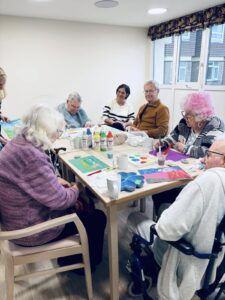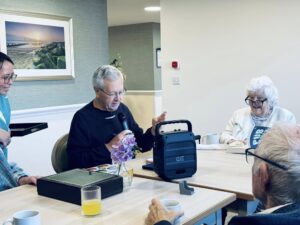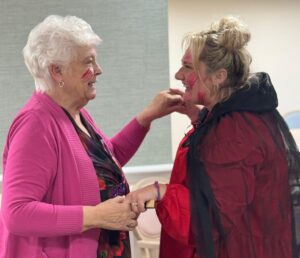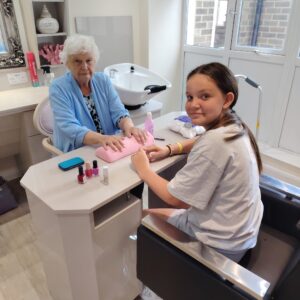
Daily activities & therapies in dementia care may help relieve symptoms in people with dementia. There are many different therapies and daily activities available that can improve the quality of life of people with dementia.
Supporting a loved one with dementia is a daunting task. Dementia affects a person’s memory, thinking, and decision-making. Dementia is not a typical part of ageing, although older adults are more likely to develop it. There is currently no cure for dementia, but treatment can help relieve symptoms. Dementia therapies and activities can improve their mood and quality of life and reduce symptoms. This guide focuses on the right activities at the right time, and different therapies can turn a tough day around.
What does “quality of life” really mean here?
Quality of life isn’t a single score. It’s the mix of mood, comfort, confidence, connection, and the ability to do everyday things (with support where needed). NICE’s dementia guideline encourages non-drug interventions that promote cognition, independence, and wellbeing alongside clinical care, with activities shaped around the person’s history, preferences, and strengths.
1) Cognitive Stimulation Therapy (CST): the evidence-based backbone
What it is: Usually a group programme (often twice weekly for ~7 weeks) using themed, enjoyable discussions and activities—current affairs, word games, practical tasks—led by trained facilitators. It’s designed to stimulate thinking and social interaction without feeling like a test.
Why it matters: A landmark multicentre RCT showed improvements in cognition and quality of life for people taking part in CST compared with usual care. That’s why UK services routinely offer CST for mild–to–moderate dementia.
Home version (iCST): Evidence for individual CST at home is more mixed: one large trial didn’t show cognitive gains but did report benefits to the caregiving relationship and carer wellbeing—useful when you’re building a home routine.
How to try it: Ask your memory service or local charity about CST groups; for home, pick short, playful tasks (10–20 minutes): “headline chat,” recipe reminiscing, matching objects to uses, or sorting photos by year/place.
2) Physical activity: small, regular doses beat grand plans
What it is: Walking, strength-and-balance routines, chair-based exercise, tai chi, dancing—whatever matches ability and interest.
Why it matters: Physical activity supports mobility, mood, and daily function, and the NHS specifically suggests dance, tai chi, yoga, swimming, or walking groups for people living with dementia. Research overall links fitness and activity with better function in older adults, and systematic reviews in dementia point to functional benefits, even if cognitive effects vary. The direction of travel is clear: move more, safely, and often.
How to try it:
- Start with 10–15 minutes after breakfast: hallway laps with music, sit-to-stand practice, or a gentle walk to the corner shop.
- Add a balance snack at 3 pm: heel-to-toe steps along the worktop, or seated marching with a timer.
- Build in a social movement once a week: a dementia-friendly walking group or dance session if available locally.
3) Music & singing: engagement first, evidence with nuance
What it is: Familiar playlists, guided singing, rhythm games, or a local “Singing for the Brain” group.
Why it matters: The NHS highlights singing for improving mood and wellbeing (and because it’s genuinely fun). Evidence from rigorous reviews is mixed—some Cochrane analyses don’t show consistent improvements in quality of life or agitation across all studies—but many people still engage beautifully with music, especially when it’s personalised. The key is to use music to connect, cue movement, and soothe—not as a standalone cure-all.
How to try it:
- Build a “good-morning” playlist (3 songs).
- Use rhythm to cue movement (clap-and-step, gentle swaying).
- Keep volume moderate and pick familiar tracks; watch body language and dial back if overstimulating.
4) Reminiscence & life story work: identity, not interrogation
What it is: Sharing stories from the past using photos, objects, letters, recipes, or short video clips. Often crafted into a life story book or digital album.
Why it matters: NICE quality standards emphasise activities to promote wellbeing built around a person’s life experiences and preferences. Cochrane reviews on reminiscence therapy suggest potential benefits, though effects vary by format and setting; what’s consistent is how personalised reminiscence can lift mood and spark connection.
How to try it: Choose one theme per week—first job, favourite holiday, music from a decade—and build a small “memory tray” with 3–5 prompts. Keep sessions short and pressure-free; follow the story, not the script.
5) Occupational therapy (OT) at home: confidence in everyday tasks
What it is: Goal-focused support to make daily activities (ADLs) easier and safer. It includes washing, dressing, cooking, getting out and about—often by adapting tasks and the environment.
Why it matters: Reviews suggest home-based OT can improve activity performance and caregiver outcomes in dementia; NICE also promotes occupational therapy or cognitive rehabilitation to support functional ability in mild–to–moderate dementia.
How to try it:
- Pick one meaningful task (e.g., making tea).
- Break it into tiny steps (kettle → water → switch → mug → teabag…).
- Use visual cues (sticky-note prompts, laid-out items) and fade help over time.
6) Arts, crafts & creativity: expression over perfection
Painting, clay, collage, knitting, poetry, drama—creative work offers sensory stimulation, purpose, and pride. The NHS recommends arts-based activities to keep people involved and connected; the trick is to adapt the task: thicker brushes, high-contrast colours, larger needles, pre-cut shapes, and no right answers.
7) Nature & gardening: calm, movement, meaning
From houseplants to balcony herbs to community gardens, nature gives multi-sensory, season-by-season structure. Watering pots is a purposeful movement; smelling herbs or arranging flowers can steady the mood and cue memories. Many families create a mini sensory corner: lavender, basil, a wind spinner, and a comfortable chair.
8) Social connection: cafés, clubs, and micro-moments
NHS guidance points to memory cafés and peer groups because human connection matters as much as any therapy. A coffee with an old friend, a phone call with a sibling, or a weekly community drop-in can anchor the week and fight isolation.
9) Building a day that works (home routine you can copy)
Think in three blocks with plenty of breathing space.
Morning (activation)
- 10–15 mins movement (walk, chair exercises).
- CST-style chat (headline, photo prompt).
- One practical task (lay table, water plants).
Afternoon (social/creative)
- Light arts or music (sing-along playlist).
- Reminiscence theme (memory tray).
- Short outdoor time (balcony, garden, street).
Evening (wind-down)
- Gentle stretches, hand massage, or faith practice.
- Familiar TV/radio at low volume.
- Sleep cues: dim lights, warm drink, consistent bedtime.
Attach activities to anchors you already do (after tea, before the news). Keep sessions short (10–30 minutes), rotate favourites, and don’t be afraid to stop early on low-energy days. The goal of daily activities & therapies in dementia care that improve quality of life is enjoyment and ease, not ticking boxes.
The bottom line
Daily activities & therapies in dementia care that improve quality of life don’t need to be complicated or clinical. They need to be personal, safe, and regular. Use CST principles to keep minds engaged, movement to protect function, music, and reminiscence to spark joy and identity, and OT ideas to make everyday tasks easier. Test, tweak, and celebrate the little wins—they add up.
Netto Care is your reliable partner in caring for your loved ones with Dementia. We offer high-end elderly care in Southend-on-Sea, Essex, with highly trained staff in dementia care.
Call us today to improve the quality of life of your loved ones with dementia.






